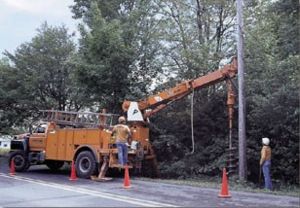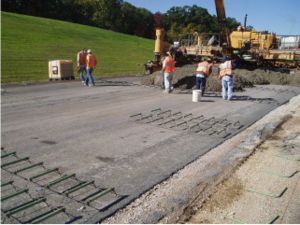237.5 Special Provisions: Difference between revisions
m EPG article references clarified. EPG articles are not referenced as "sections" but as "articles" or as "EPG xxx". |
updated per RR 3639 |
||
| (5 intermediate revisions by 2 users not shown) | |||
| Line 1: | Line 1: | ||
[[image:237 contractor surveying and staking.jpg|left| | [[image:237 contractor surveying and staking.jpg|left|225px|thumb|<center>'''Contractor Furnished Surveying and [[238.3 Route Surveying#238.3.20 Staking|Staking]]'''</center>]] | ||
{|style="padding: 0.3em; margin-left:15px; border:1px solid #a9a9a9; text-align:center; font-size: 95%; background:#f5f5f5" width="160px" align="right" | {|style="padding: 0.3em; margin-left:15px; border:1px solid #a9a9a9; text-align:center; font-size: 95%; background:#f5f5f5" width="160px" align="right" | ||
| Line 12: | Line 12: | ||
===237.5.1 Job Special Provisions=== | ===237.5.1 Job Special Provisions=== | ||
[ | [[Job_Special_Provisions|Job special provisions]] are usually prepared by the district to cover items of work unique to a specific project and not adequately explained on the plans or in the standard specifications. A simple plan note is preferred to a written job special provision. Job special provisions are used to specify types of materials rather than using notes on plans. They are not written for the sole purpose of establishing an item number. Special “99” item numbers always require a job special provision unless they are a modification of a standard or non-standard item number where the modification can clearly be defined on the plans. It is best to give the 99 number a description of Modified “Standard Item Description” to notify the contractor that a change is being made to this standard bid item. | ||
Considerable care is exercised in writing job special provisions. Clarity of intent is most important and must be achieved without wordy, lengthy, or overly detailed statements. Terms or phrases without a well-understood or definite meaning must be avoided. When a condition is mandatory, the word “shall” is used. If a condition is permissive or optional, the word “may” is used. Generally, the provisions state the contractor “shall” perform an action, and the commission “will” perform an action. | Considerable care is exercised in writing job special provisions. Clarity of intent is most important and must be achieved without wordy, lengthy, or overly detailed statements. Terms or phrases without a well-understood or definite meaning must be avoided. When a condition is mandatory, the word “shall” is used. If a condition is permissive or optional, the word “may” is used. Generally, the provisions state the contractor “shall” perform an action, and the commission “will” perform an action. | ||
Job special provision and standard specification styles are similar and contains five basic parts: (1) Description | Job special provision and standard specification styles are similar and contains five basic parts: | ||
:(1) Description | |||
:(2) Material | |||
:(3) Construction Requirements | |||
:(4) Method of Measurement | |||
:(5) Basis of Payment. | |||
The use of trade names in job special provisions is discouraged. However, in special circumstances, the use of a proprietary item may be necessary. When it is necessary to use a proprietary or experimental item, a Public Interest Finding (refer to [[131 | Job special provisions may also supplement or modify the standard specifications, in which case a complete specification need not be prepared but only a reference to the standard specification with the necessary information supplementing or modifying the standard specification. Any portion of the standard specifications to be modified is clearly identified. | ||
The use of trade names in job special provisions is discouraged. However, in special circumstances, the use of a proprietary item may be necessary. When it is necessary to use a proprietary or experimental item, a Public Interest Finding (refer to [[131.2 Proprietary Items and Public Interest Findings|EPG 131.2 Proprietary Items and Public Interest Findings]]) and/or an [[media:Experimental Work Plan, Figure 237.5.doc|Experimental Work Plan]] is to accompany the letter of transmittal when the contract plans are submitted. | |||
===237.5.2 Standardized Job Special Provisions=== | ===237.5.2 Standardized Job Special Provisions=== | ||
Job special provisions that are frequently used have been standardized and are available for district use. | Job special provisions that are frequently used have been standardized and are available for district use. These job special provisions are designated as JSP (Job Special Provision), LPA (Local Public Agency Special Provision) or JSP Packages (for the Job Order Contracts (JOC), Seal Coat and CLC programs). | ||
If the district revises a standardized job special provision for a | If the district revises a standardized job special provision for a project, the special provision shall be designated by name only on the job special provisions table of contents and in the heading of the text of the job special provision. The JSP, or the LPA number must be removed from the title of the job special provision in the heading of the text and "Modified" added to the beginning of the title of the JSP. Any revisions made by district personnel to standardized job special provisions must be carefully undertaken. Central Office personnel will review these revised job special provisions for content and conformance to MoDOT standards. | ||
Central Office will insert standardized job special provisions into the proposal. | Central Office will insert standardized job special provisions into the proposal. Any job special provision that includes the JSP or LPA number in either the index or the title in the body is assumed to be the standardized job special provision. Central Office personnel will replace those job special provisions with the most current standard, regardless of whether the district included the body of the standardized job special provision in the proposal. Any revision made at Central Office to a district job special provision will be provided to the district for approval. Do not put “(To Be Inserted by Central Office)” next to a job special provision on the index. Central Office personnel will have to remove this wording. It is acceptable to put “(To Be Inserted by Central Office)” next to the job special provision title in the body. | ||
===237.5.3 Required Job Special Provisions=== | ===237.5.3 Required Job Special Provisions=== | ||
Some job special provisions are required in | Some job special provisions are required in projects. The specifications can require specify material, methods, or equipment for an item. Examples of job special provisions required in most projects are as follows: | ||
* General. The first job special provision in every contract tells the contractor whether the project is to be constructed under federal or state requirements. This is a standardized provision included in all projects. | * General. The first job special provision in every contract tells the contractor whether the project is to be constructed under federal or state requirements. This is a standardized provision included in all projects and defines the wage rates and what standards apply for the project. | ||
[[image:237.5 utilites.jpg|right|300px|thumb|<center>'''Utility adjustment'''</center>]] | [[image:237.5 utilites.jpg|right|300px|thumb|<center>'''Utility adjustment'''</center>]] | ||
* Traffic | * Contract Liquidated Damages. The second job special provision in every contract tells contractors when they may begin work on the project, when they have to complete the work, and what liquidated damages will be assessed if they fail to complete the work on time. This provision is included in all projects except Job Order Contracts. | ||
* Work Zone Traffic Management. See [http://www.modot.org/business/standards_and_specs/SpecbookEPG.pdf#page=4 Standard Specification Sec 104.7]. The third job special provision in every contract covers traffic management situations not covered in the standard specifications. Construction phases or stages are not included in this job special provision. All time restrictions when the contractor will not be permitted to perform construction on the roadway (i.e. A.M. and P.M. peak vehicular hours) are stated. The standardized job special provision provides an outline. This provision is included in all projects even if special situations not covered in the standard specifications do not exist. This provision is not included Job Order Contracts. | |||
* Utilities. A special provision telling the contractor the status of any known utility adjustments | * Utilities. A special provision telling the contractor the contact information for each utility and the status of any known utility adjustments. The standardized job special provision provides an outline and is required on any project with a utility adjustment. | ||
* Project Contact. A special provision tells the bidder who to contact at MoDOT regarding questions about the project. Only one project contact is to be designated for the project to provide bidders with a consistent source of answers to their questions. See [[237.12 Communication with the Public|EPG 237.12 Communication with the Public]]. A phone number and email address for the contact is required. This provision is included in all projects. | |||
* Project Contact. | |||
[[image:237.5.3 unbonded overlay.jpg|right|300px|thumb|<center>'''[[:Category:506 Concrete Overlays for Pavement#506.1.2 Portland Cement Concrete Unbonded Overlay (for Sec 506.20)|Unbonded overlay]] project'''</center>]] | [[image:237.5.3 unbonded overlay.jpg|right|300px|thumb|<center>'''[[:Category:506 Concrete Overlays for Pavement#506.1.2 Portland Cement Concrete Unbonded Overlay (for Sec 506.20)|Unbonded overlay]] project'''</center>]] | ||
* Supplemental Revisions. This special provision contains revisions to the standard specifications that have not been implemented into the Supplemental Specification Revisions (“blue pack”). This provision is included in all projects when it contains specification revisions. | * Supplemental Revisions. This special provision contains revisions to the standard specifications that have not been implemented into the Supplemental Specification Revisions (“blue pack”). This provision is included in all projects when it contains specification revisions. | ||
[[image:237.5.3 Bridge demolition.jpg|right|300px|thumb|<center>'''Demolition for bridge projects'''</center>]] | [[image:237.5.3 Bridge demolition.jpg|right|300px|thumb|<center>'''Demolition for bridge projects'''</center>]] | ||
The following Job Special Provisions were removed from the standard specifications and will need to be used on projects whenever necessary: | The following Job Special Provisions were removed from the standard specifications and will need to be used on projects whenever necessary: | ||
* [ | * [https://epg.modot.org/forms/JSP/JSP0413.docx Masonry Construction (Section 610)] | ||
* [ | * [https://epg.modot.org/forms/JSP/JSP0407.docx Office for Engineer (Section 615)] | ||
* [ | * [https://epg.modot.org/forms/JSP/JSP0408.docx Placing State Owned Pipe (Section 729)] | ||
* [ | * [https://epg.modot.org/forms/JSP/JSP0409.docx Overhead Lighting of Signs (Section 903)] | ||
===237.5.4 General Provisions=== | ===237.5.4 General Provisions=== | ||
Latest revision as of 15:01, 14 February 2023

| Figure |
| Experimental Work Plan |
Special provisions are included in contracts as required to define work or procedures not covered in the standard specifications, and as necessary to supplement or modify items in the standard specifications. Each contract includes a table of contents for job special provisions.
237.5.1 Job Special Provisions
Job special provisions are usually prepared by the district to cover items of work unique to a specific project and not adequately explained on the plans or in the standard specifications. A simple plan note is preferred to a written job special provision. Job special provisions are used to specify types of materials rather than using notes on plans. They are not written for the sole purpose of establishing an item number. Special “99” item numbers always require a job special provision unless they are a modification of a standard or non-standard item number where the modification can clearly be defined on the plans. It is best to give the 99 number a description of Modified “Standard Item Description” to notify the contractor that a change is being made to this standard bid item.
Considerable care is exercised in writing job special provisions. Clarity of intent is most important and must be achieved without wordy, lengthy, or overly detailed statements. Terms or phrases without a well-understood or definite meaning must be avoided. When a condition is mandatory, the word “shall” is used. If a condition is permissive or optional, the word “may” is used. Generally, the provisions state the contractor “shall” perform an action, and the commission “will” perform an action.
Job special provision and standard specification styles are similar and contains five basic parts:
- (1) Description
- (2) Material
- (3) Construction Requirements
- (4) Method of Measurement
- (5) Basis of Payment.
Job special provisions may also supplement or modify the standard specifications, in which case a complete specification need not be prepared but only a reference to the standard specification with the necessary information supplementing or modifying the standard specification. Any portion of the standard specifications to be modified is clearly identified.
The use of trade names in job special provisions is discouraged. However, in special circumstances, the use of a proprietary item may be necessary. When it is necessary to use a proprietary or experimental item, a Public Interest Finding (refer to EPG 131.2 Proprietary Items and Public Interest Findings) and/or an Experimental Work Plan is to accompany the letter of transmittal when the contract plans are submitted.
237.5.2 Standardized Job Special Provisions
Job special provisions that are frequently used have been standardized and are available for district use. These job special provisions are designated as JSP (Job Special Provision), LPA (Local Public Agency Special Provision) or JSP Packages (for the Job Order Contracts (JOC), Seal Coat and CLC programs).
If the district revises a standardized job special provision for a project, the special provision shall be designated by name only on the job special provisions table of contents and in the heading of the text of the job special provision. The JSP, or the LPA number must be removed from the title of the job special provision in the heading of the text and "Modified" added to the beginning of the title of the JSP. Any revisions made by district personnel to standardized job special provisions must be carefully undertaken. Central Office personnel will review these revised job special provisions for content and conformance to MoDOT standards.
Central Office will insert standardized job special provisions into the proposal. Any job special provision that includes the JSP or LPA number in either the index or the title in the body is assumed to be the standardized job special provision. Central Office personnel will replace those job special provisions with the most current standard, regardless of whether the district included the body of the standardized job special provision in the proposal. Any revision made at Central Office to a district job special provision will be provided to the district for approval. Do not put “(To Be Inserted by Central Office)” next to a job special provision on the index. Central Office personnel will have to remove this wording. It is acceptable to put “(To Be Inserted by Central Office)” next to the job special provision title in the body.
237.5.3 Required Job Special Provisions
Some job special provisions are required in projects. The specifications can require specify material, methods, or equipment for an item. Examples of job special provisions required in most projects are as follows:
- General. The first job special provision in every contract tells the contractor whether the project is to be constructed under federal or state requirements. This is a standardized provision included in all projects and defines the wage rates and what standards apply for the project.

- Contract Liquidated Damages. The second job special provision in every contract tells contractors when they may begin work on the project, when they have to complete the work, and what liquidated damages will be assessed if they fail to complete the work on time. This provision is included in all projects except Job Order Contracts.
- Work Zone Traffic Management. See Standard Specification Sec 104.7. The third job special provision in every contract covers traffic management situations not covered in the standard specifications. Construction phases or stages are not included in this job special provision. All time restrictions when the contractor will not be permitted to perform construction on the roadway (i.e. A.M. and P.M. peak vehicular hours) are stated. The standardized job special provision provides an outline. This provision is included in all projects even if special situations not covered in the standard specifications do not exist. This provision is not included Job Order Contracts.
- Utilities. A special provision telling the contractor the contact information for each utility and the status of any known utility adjustments. The standardized job special provision provides an outline and is required on any project with a utility adjustment.
- Project Contact. A special provision tells the bidder who to contact at MoDOT regarding questions about the project. Only one project contact is to be designated for the project to provide bidders with a consistent source of answers to their questions. See EPG 237.12 Communication with the Public. A phone number and email address for the contact is required. This provision is included in all projects.

- Supplemental Revisions. This special provision contains revisions to the standard specifications that have not been implemented into the Supplemental Specification Revisions (“blue pack”). This provision is included in all projects when it contains specification revisions.

The following Job Special Provisions were removed from the standard specifications and will need to be used on projects whenever necessary:
237.5.4 General Provisions
General provisions are prepared and included in contracts by Design.